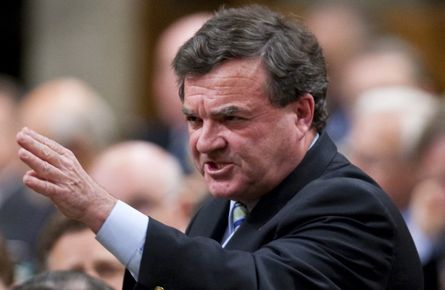The Commons: Does anyone here know how to balance a cheque book?
In this House nothing can be said to be certain, except aspersions and taxes
jim flaherty
Share
 The Scene. Bob Rae opened this afternoon’s session with a vigorous display, lecturing the government on the need to reconcile environmental and economic policy and even thumping his desk with his right hand—his flare seemed to ignite a certain passion on all sides. So this last afternoon before a blessed break week was full of vim, most notably on the matter of our overdrawn national bank account.
The Scene. Bob Rae opened this afternoon’s session with a vigorous display, lecturing the government on the need to reconcile environmental and economic policy and even thumping his desk with his right hand—his flare seemed to ignite a certain passion on all sides. So this last afternoon before a blessed break week was full of vim, most notably on the matter of our overdrawn national bank account.
“Mr. Speaker, it is the wrong choice to cut taxes for the largest and wealthiest corporations while the global economy remains fragile,” Bonnie Crombie cried from the back row of the Liberal side. “It is the wrong choice to cut taxes for the largest and wealthiest corporations while a debt crisis rages in Europe. It is the wrong choice to cut taxes for the largest and wealthiest corporations when markets fluctuate at the drop of a hat. Why does the government plan to borrow money and mortgage our children’s future to pay for its reckless corporate tax cuts?”
The Finance Minister did not have an answer for this one, but he did have aspersions (and in this place that’ll do).
“Mr. Speaker, we know that the Liberal opposition wants to raise taxes,” Mr. Flaherty declared. “They want to raise personal taxes for Canadians. They want to raise taxes for small and medium size Canadian businesses. They even muse about raising the GST. We know, from the way they have voted in this place, that they are opposed to the tax reductions that we have made over the last four years, that is $3,000 on average for every Canadian family in tax reductions over the course of the past four years.”
Matters quickly descended into noise from there.
“Mr. Speaker,” Ms. Crombie shot back, “the minister drove the province of Ontario into debt.”
The government side howled as a dozen members helpfully pointed in the direction of Bob Rae, the former Ontario premier seated in the Liberal front row.
“It is thanks to a decade of sound Liberal financial management,” Ms. Crombie continued after a pause, “we are not in the same mess as Greece and other countries.”
More hooting and mocking from the government members.
“I know the Liberals are in favour of raising taxes,” Mr. Flaherty said when Ms. Crombie had finally finished. “Most Canadians actually do not want to pay more taxes and they do not want to go through the cuts that the Liberal Party of Canada government did in the mid-1990s.”
Mr. Flaherty went on to refer to Mr. Rae who had, in a previous career, apparently lamented for the spending cuts of the previous Liberal government. Alas, the Finance Minister’s time ran out before he could finish and then it was John McCallum, Mr. Flaherty’s old nemesis, who was up with things to say.
“Mr. Speaker,” Mr. McCallum fired back, “the only party that wants to raise taxes is the Conservative Party with its massive EI premium hikes, costing 200,000 jobs.”
Over again to Mr. Flaherty, who noted that Mr. McCallum had, in 2007, supported cuts to the corporate tax rate. Then back to Mr. McCallum, who wished to provide some context to that long-ago year. The two combatants were now shadowboxing each other, each going red, or at least redder, in the face from the effort expended.
“Mr. Speaker, remember that in 2007 we were running a surplus and we were in favour of lower corporate taxes, but not when it puts the country into greater debt, which is precisely what the minister is doing,” ventured Mr. McCallum.
“We are at a crossroads,” he declared. “Borrow money today to cut corporate taxes or freeze corporate taxes, fight the deficit and invest in education.”
“We can take the Conservative path of the eighties and become more like Greece, or the Liberal path of the nineties and become more prosperous,” he concluded. “Why are Conservatives choosing more debt over prosperity?”
And so Mr. Flaherty was obviously compelled to question Mr. McCallum’s patriotism. “Mr. Speaker, I know what the Liberal government wreaked on the Canadian people in the mid-1990s, what it did to our schools, what it did to higher tuition in universities, what it did to our hospitals, what it did to nurses. All of those things, that is what the Liberals did in the 1990s,” he reported. “This is Canada. We have the best fiscal situation in the G7. We have the soundest financial system in the G7. We have the highest credit rating in the world. The honourable member should be proud of the performance of his country and stop knocking it.”
And so it was settled. We shan’t raise taxes, we shan’t cut spending. We shall do nothing and simply hope for the best.
The Stats. The environment, the oil industry and Helena Guergis, five questions each. The United Nations and taxation, four questions each. Culture, three questions. Securities regulation, Haiti and Hepatitis C, two questions each. Parliament, the budget, the navy, labour and firearms, one question each.
John Baird, 11 answers. Jim Flaherty, seven answers. Christian Paradis, four answers. James Moore, three answers. Lawrence Cannon, Jim Prentice, Jason Kenney and Leona Aglukkaq, two answers each. Diane Finley, Keith Ashfield, Peter MacKay, Lisa Raitt and Vic Toews, one answer each.